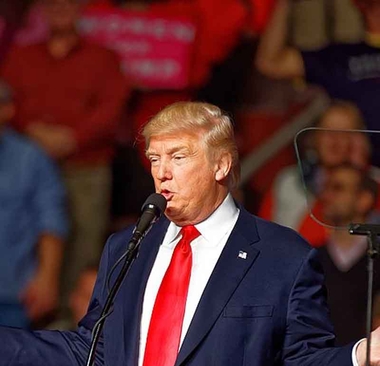How Trump wants to whack Medicare and Medicaid spending

When he first ran for president, Donald Trump blasted the Obama administration for hurting senior citizens by slashing billions from Medicare.
Now, the tables have turned. Democrats are piling on Trump, accusing him of breaking his campaign promise not to touch the federal health care program for the elderly.
The Trump administration unveiled a budget Monday that would reduce spending in Medicare as well as Medicaid, which provides coverage for low-income Americans, by hundreds of billions of dollars compared to current law.
Former Vice President Joe Biden, who is considering a run for the 2020 Democratic nomination, told a crowd Tuesday that Trump is curtailing spending to pay for the tax cut he gave the super wealthy, a reference to the 2017 GOP tax law.
"Trading Medicare and Medicaid for tax breaks?," he said in a speech before the International Association of Fire Fighters. "How is that going to help the people in this room or most of the people you live with? How is that going to help this country?"
It's notable that Trump is proposing even larger spending reductions for Medicare than he has over the past two years. In fact, his first budget barely touched the program at all.
Trump's 2020 budget, however, reduces Medicare spending by $845 billion over 10 years compared to current law. That includes shifting roughly $269 billion in funding for training medical residents and payments to hospitals for caring for the uninsured to the Department of Health and Human Services' budget.
Factoring in this change, Medicare spending would be $575 billion lower, said Marc Goldwein, senior vice president at the Committee for a Responsible Federal Budget, a think tank.
Trump's budget also includes other provisions -- such as medical liability reform and drug industry changes -- that would indirectly affect Medicare and bring federal savings down to roughly $515 billion, Goldwein said.
The vast majority of the Medicare changes are reductions in payments to providers, which already has several hospital groups up in arms.
"The cuts proposed today raise serious concerns about how hospitals and health systems can ensure they serve as the safety net for their patients," wrote Rick Pollack, chief executive of the American Hospital Association, in a blog post after the budget proposal was released.
Medicare currently pays hospital outpatient departments more than doctors' offices for certain services. The Trump administration wants to eliminate that differential. It also wants to slow the growth of payments for skilled nursing, inpatient rehab facilities and home health services, said Tricia Neuman, director, Program on Medicare Policy at the Kaiser Family Foundation.
Democrats have wasted no time highlighting these cuts, with House Majority Leader Steny Hoyer of Maryland accusing the President of abandoning senior citizens.
The rhetoric harkens back to earlier this decade when Republicans lashed out at former President Barack Obama for including similar provider payment cuts in the Affordable Care Act, saying that he was hurting the elderly.
Obama also curtailed payments to private insurers in Medicare Advantage, which Trump does not do. His administration, in fact, promotes Medicare Advantage, but there is also less evidence these days of significant federal overpayments in the program, Neuman said.
When it comes to Medicaid, Trump once again floats huge spending reductions as compared to current law, though it's hard to decipher the exact amount since some are interconnected. But the budget also serves as a menu of longtime Republican visions for the program, including repealing Medicaid expansion and Obamacare subsidies and giving states a fixed sum of money, known as a block grant, instead.
Plus, it would limit federal support for the traditional Medicaid program by providing states either a block grant or a set amount for each participant.
One new proposal is requiring able-bodied, working-age Medicaid enrollees to work. The Trump administration is promoting work mandates and has approved requests from eight states to add it to their programs. But his budget would make work requirements mandatory nationwide, said Robin Rudowitz, associate director for the Program on Medicaid and the Uninsured at the Kaiser Family Foundation.
By Tami Luhby, CNN. The-CNN-Wire™ & © 2019 Cable News Network, Inc., a Time Warner Company. All rights reserved.
The Gayly – March 13, 2019 @ 10 a.m. CDT.





